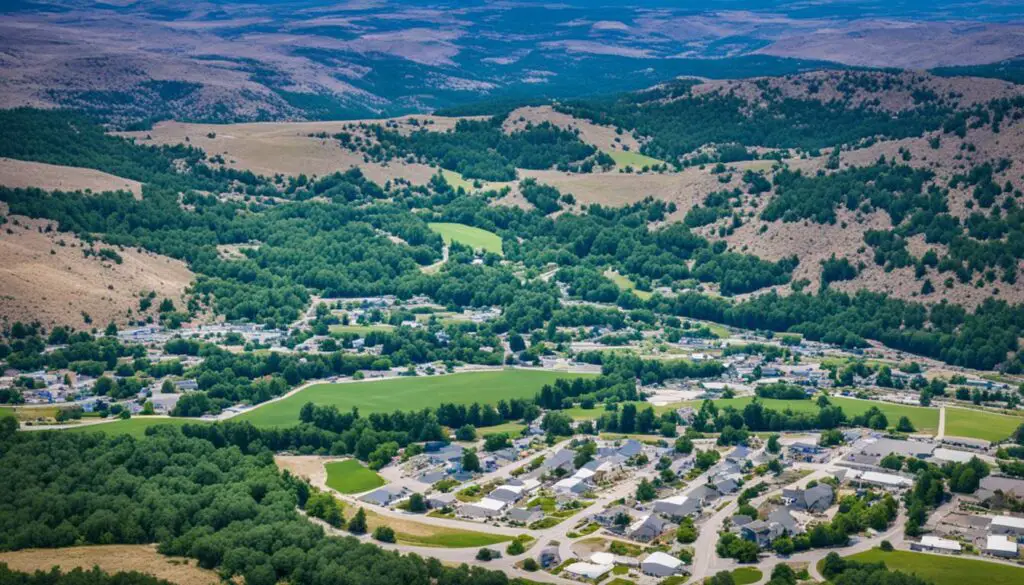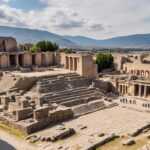Bethel, mentioned over 60 times in the Bible, holds significant biblical and spiritual importance. Known as the House of God, it played a central role in the lives of biblical figures such as Abraham and Jacob. The meaning of Bethel in the Bible goes beyond its physical location, encompassing divine encounters, worship practices, and deep theological themes.
Key Takeaways:
- Bethel, the House of God, holds immense spiritual significance in the Bible.
- It was a place of divine encounters and worship practices for biblical figures.
- Bethel’s rich historical background and geographical location contribute to its importance.
- Archaeological excavations at Bethel have provided insights into biblical times.
- Bethel’s legacy continues to inspire believers to seek God’s presence and embrace His teachings.
Historical Significance of Bethel
Bethel, formerly known as Luz, holds a rich historical background in the Old Testament. It occupies a significant place in scripture as one of the first locations where the Hebrew people had profound encounters with God. One notable event is Jacob’s dream of a stairway to heaven, where he received divine revelations and promises from God.
Bethel, meaning “house of God,” served as a physical place where people could connect with the divine and experience His presence. It holds a vital role in biblical history and showcases the deep spiritual yearnings of humanity.
In the words of Jacob after his extraordinary experience, he said,
“Surely, the LORD is in this place, and I was not aware of it. How awesome is this place! This is none other than the house of God; this is the gate of heaven.”
These words reflect the awe and reverence that Bethel evoked in the hearts of those who encountered God there. It became a sacred site, embodying the bridge between heaven and earth and symbolizing the divine connection individuals and communities could experience.
Historical Encounters at Bethel
One of the most significant encounters in Bethel’s history is Jacob’s dream. In this visionary experience, Jacob saw a ladder or stairway reaching from earth to heaven, with angels ascending and descending. God stood at the top of the ladder and spoke promises of blessing, protection, and land to Jacob, affirming His covenant with him and his descendants.
Another notable event is Abraham’s invocation of God’s name in Bethel. It marked a pivotal moment in Abraham’s journey of faith, where he called upon the name of the Lord and built an altar to worship Him.
These encounters, along with various other events, emphasize the historical significance of Bethel in the Old Testament. The biblical narratives surrounding Bethel provide insights into the spiritual experiences, divine revelations, and faithful worship practices of the Hebrew people.
Bethel’s history in the Bible is a testament to the profound connections between God and humanity and the impact of encountering the divine in a specific physical location.
The Geographical Location of Bethel
Bethel, with its geographical location in the hill country of Samaria in the Holy Land, holds significant historical and religious importance. Situated just 10 miles north of Jerusalem, this ancient biblical site served as a vital crossroads for travelers, fostering a diverse range of encounters and sacred experiences.

Positioned amidst the scenic and strategic region of Samaria, Bethel held a central role in the spiritual and cultural landscape of the Holy Land. Its location made it easily accessible to pilgrims and wanderers, attracting individuals seeking spiritual solace, divine revelations, and opportunities for worship.
“Bethel’s geographical location in the hill country of Samaria epitomizes its status as a sacred crossroads, connecting people from various regions and providing a gateway to spiritual encounters.”
Not only did its proximity to Jerusalem make it a convenient stopover for those traveling to the Holy City, but it also positioned Bethel as a significant center for communal worship and religious practices. The picturesque surroundings and natural beauty of the region further enhanced its allure, providing a serene setting for people to connect with the divine.
Key Features of Bethel’s Geographical Location
| Location | Distance from Jerusalem | Surrounding Region |
|---|---|---|
| Bethel | 10 miles | Hill country of Samaria |
Archaeological Discoveries at Bethel
Over the years, various archaeological excavations have been conducted at Bethel, revealing significant artifacts that shed light on the ancient biblical site. These discoveries provide valuable insights into the worship practices and daily life in Bethel during biblical times. From altars to pottery and structures, these findings paint a vivid picture of the vibrant community that once thrived in this sacred place.
One notable archaeological discovery at Bethel is a collection of altars. These altars were used for the offering of sacrifices and worship rituals, serving as a central focal point for the spiritual life of the ancient community. They stand as a testament to the profound reverence and devotion the people had for God.
Another fascinating find is the abundance of pottery fragments. Pottery was an essential part of daily life in Bethel, serving various purposes such as food storage, cooking, and decorative objects. The unique styles and designs of these pottery fragments provide valuable clues about the cultural practices, trade connections, and artistic expressions of the people who resided in Bethel.
Furthermore, the archaeological excavations have unearthed structures that provide insights into the layout and architecture of Bethel during biblical times. These structures include homes, public buildings, and religious structures, revealing a thriving community that was deeply rooted in their faith and daily interactions.
Through these archaeological discoveries, we gain a deeper understanding of the ancient world of Bethel and its significance in biblical history. These artifacts not only enrich our knowledge of the past but also help us connect with the spiritual journeys of the people who once walked these sacred grounds.
| Archaeological Discoveries at Bethel | Description |
|---|---|
| Altars | Used for sacrifices and worship rituals |
| Pottery Fragments | Reflecting daily life, trade connections, and artistic expressions |
| Structures | Providing insights into the layout and architecture of Bethel |
The Theological Themes of Bethel
Bethel, as depicted in the Bible, encompasses several profound theological themes that emphasize its theological significance and its place in theology.
First and foremost, Bethel is recognized as a sacred place of divine communication. Throughout the biblical accounts, it becomes apparent that Bethel serves as a conduit for God to interact with humanity. Whether through dreams, visions, or direct encounters, individuals at Bethel experience powerful divine dialogue, receiving guidance, revelations, and promises from the Almighty.
Furthermore, Bethel represents a site of spiritual transformation. The encounters that take place at Bethel frequently lead to profound changes in individuals’ lives and spiritual journeys. It is at Bethel where people experience personal growth, renewed faith, and a deeper understanding of their relationship with God.
“Every encounter at Bethel brought about a transformative experience, solidifying the notion that God’s presence at this sacred place is capable of changing lives forever.” – Theological scholar
A crucial aspect of Bethel’s theological significance is its role in highlighting the importance of worship, prayer, and obedience. The biblical narratives surrounding Bethel consistently emphasize the reverence and awe that believers should hold for God. Bethel becomes a symbol of true worship, where individuals offer sacrifices, seek God’s guidance, and display unwavering devotion in their spiritual practices.
Bethel’s theological themes remind believers of the omnipresence of God, His desire for genuine worship, and the transformative power of encountering Him in our lives.
The Theological Themes of Bethel:
- Divine communication and encounters
- Spiritual transformation
- Importance of worship, prayer, and obedience
The Theological Themes of Bethel
| Theological Themes | Description |
|---|---|
| Divine communication and encounters | Bethel serves as a sacred place where individuals experience divine dialogue and receive guidance and revelations from God. |
| Spiritual transformation | Encounters at Bethel lead to profound changes in individuals’ lives, fostering personal growth, and deepening their faith. |
| Importance of worship, prayer, and obedience | Bethel highlights the reverence and devotion believers should hold for God, emphasizing the significance of true worship, prayer, and obedience. |

These theological themes of Bethel continue to resonate with believers today, inspiring them to seek divine encounters, pursue spiritual transformation, and engage in worship, prayer, and obedience.
Key Biblical Events at Bethel
Bethel holds a significant place in biblical history, witnessing several key events that shaped the spiritual journey of biblical figures and the people of Israel. These events showcased divine encounters, worship practices, and moments of revelation that continue to inspire believers today.
1. Abraham’s Invocation of God’s Name
One of the pivotal moments at Bethel was when Abraham invoked the name of God. In Genesis 12:8, it is mentioned that Abraham built an altar to the Lord and called on His name at Bethel. This act of worship and acknowledgement of God’s presence highlights the importance of revering and honoring the divine.
2. Jacob’s Dream of a Ladder to Heaven
A well-known event at Bethel is Jacob’s dream of a ladder reaching from earth to heaven. In Genesis 28:12, Jacob saw angels ascending and descending the ladder, and he received a divine message and blessing from God. This dream symbolizes the connection between heaven and earth, emphasizing the significance of spiritual encounters and communication with the divine.
“Surely the Lord is in this place, and I was not aware of it.” – Genesis 28:16
3. Setting up of Altars and Worship Practices
Bethel was a place of worship and the setting up of altars by various biblical figures. Jacob, upon returning to Bethel, built an altar and called it El-Bethel, meaning “God of Bethel” (Genesis 35:7). This act of worship at Bethel demonstrated the commitment to seek God’s presence and offer sacrifices as an expression of faith and gratitude.
These key events at Bethel played a crucial role in shaping the spiritual narrative of the Bible and the experiences of its characters. They underscore the significance of divine encounters, worship practices, and the pursuit of God’s presence in the lives of believers.
Cultural and Religious Practices at Bethel
Bethel, a central place of worship in the Bible, played a significant role in the cultural and religious practices of ancient Israelites. These practices were integral to the expression of faith and the connection between God and His people.
Offering of Sacrifices
The act of offering sacrifices at Bethel was a prominent cultural practice. It involved presenting animal offerings to God as an expression of gratitude, devotion, and seeking forgiveness. This act demonstrated the Israelites’ commitment to worship and honor God.
Inquiring of God
Inquiring of God was another essential religious practice at Bethel. People sought divine guidance, wisdom, and direction by seeking God’s counsel and receiving prophetic messages. As a place of divine encounters, Bethel served as a spiritual gateway for communication with the Almighty.
“And God said to Jacob, ‘Arise, go up to Bethel and dwell there. Make an altar there to the God who appeared to you when you fled from your brother Esau.'” – Genesis 35:1
Establishment of Altars
Altars held deep religious significance and were crucial in the worship practices at Bethel. They served as sacred spaces for offerings, prayers, and moments of communion with God. Altars were constructed to honor God’s presence and mark significant encounters with the divine.
These cultural and religious practices at Bethel highlighted the importance of faith, worship, and obedience in the lives of the Israelites. They fostered a sense of spiritual connection, reverence, and devotion to God.

In the next section, we will explore the prophetic and eschatological significance of Bethel, diving into the messages received and the warnings conveyed at this biblical site.
Prophetic and Eschatological Significance of Bethel
Bethel holds a profound prophetic significance in the Bible. It served as a place where prophets received divine revelations and delivered messages from God to His people. Through these encounters, Bethel became a hub of spiritual communication and a channel for God’s divine guidance.
The word of the Lord came to me, saying, “Go to Bethel and prophesy.” – Amos 7:12
In addition to its prophetic role, Bethel also carries a powerful eschatological meaning. Eschatology refers to the study of end times and the ultimate destiny of believers. In this context, Bethel symbolizes the spiritual journey of believers and their ultimate destination in God’s heavenly kingdom. It signifies the fulfillment of God’s promises and the eternal union between mankind and their Creator.

Faith Lessons from Bethel
Bethel offers several faith lessons for believers today. It reminds us of the importance of seeking God’s presence, worshiping Him wholeheartedly, and remaining faithful to His teachings. Bethel also teaches us about the dangers of idolatry and the need for obedience to God’s commands.
“Seek the Lord your God, and you will find Him if you seek Him with all your heart and with all your soul.”
– 1 Chronicles 28:9
Lessons from Bethel:
- The importance of seeking God’s presence in our lives
- Wholehearted worship as a way to connect with the divine
- Faithfulness to God’s teachings and commands
- Avoiding idolatry and the worship of false gods
Remaining Faithful to God’s Teachings
In the story of Bethel, we see how Abraham and Jacob encountered God and built altars as a way to honor Him. These acts of worship remind us of the significance of remaining faithful to God’s teachings and commands. In a world filled with distractions and temptations, Bethel teaches us to stay focused on our relationship with God and to prioritize His presence in our lives.
The Dangers of Idolatry
Bethel serves as a cautionary tale about the dangers of idolatry. In the Bible, we see how the people of Bethel fell into idol worship, straying from the true worship of God. This serves as a reminder for us to examine our own lives and ensure that we are not placing anything or anyone above God in our hearts and minds.
Through the faith lessons of Bethel, believers today can learn to seek God wholeheartedly, remain faithful to His teachings, and avoid the pitfalls of idolatry. Bethel’s story continues to inspire us to deepen our faith and commitment to God.
| Faith Lessons from Bethel | Key Takeaways |
|---|---|
| Seeking God’s presence | God rewards those who earnestly seek Him |
| Wholehearted worship | Worshiping God with sincerity and devotion brings us closer to Him |
| Remaining faithful to God’s teachings | Obeying God’s commandments leads to a blessed and fulfilling life |
| Avoiding idolatry | Putting God above all else and avoiding worshiping false gods |

Bethel’s Spiritual Legacy
Bethel’s spiritual legacy is a testament to its enduring impact on individuals and communities. Through the retelling of its stories, teachings, and values, Bethel has shaped the faith of generations and continues to inspire believers to deepen their relationship with God and embrace His divine presence.
“Bethel’s legacy is a source of spiritual guidance and inspiration. It represents a place where people encountered God and experienced His transformative power. The stories of Abraham’s invocation, Jacob’s dream, and the establishment of altars resonate with believers, reminding them of the importance of seeking God’s presence in their lives.”
The teachings and values associated with Bethel provide a moral compass for believers, guiding them in their spiritual journey. The legacy of Bethel in the Bible emphasizes the significance of worship, prayer, and obedience in cultivating a vibrant relationship with God.
In embracing Bethel’s legacy, believers are encouraged to seek God’s presence wholeheartedly, anchor their faith in His promises, and remain faithful to His teachings. The stories and lessons of Bethel serve as a reminder that true worship transcends physical locations and is rooted in a genuine connection with God.
Bethel’s Legacy in the Bible
| Legacy | Significance |
|---|---|
| Divine Encounter | Bethel serves as a symbol of meeting God, experiencing His presence, and receiving divine revelations. |
| Spiritual Transformation | The stories of Bethel inspire believers to seek personal transformation through encounters with God and spiritual growth. |
| Faith and Obedience | Bethel’s legacy highlights the importance of faith, obedience to God’s commands, and living out His teachings. |
| Inspiration | The stories and teachings of Bethel continue to inspire believers to deepen their relationship with God and embrace His divine presence. |
Bethel’s spiritual legacy endures as a constant reminder of God’s faithfulness and His desire to intimately connect with His people. By embracing the values and teachings of Bethel, believers can find guidance, inspiration, and a deeper understanding of their faith.
Modern-Day Significance of Bethel
Although the physical importance of Bethel has diminished in modern times, its spiritual significance remains relevant and enduring. Bethel serves as a powerful symbol of divine encounters, spiritual transformation, and the need for authentic worship and faith. It continues to inspire believers to seek a deeper understanding of God and His presence in their lives.
“Bethel is a place where heaven meets earth, where the sacred intersects with the secular. It reminds us that God is not confined to a specific location or time period, but He can be encountered and experienced anywhere and at any time.”
Today, Bethel stands as a testament to the ongoing pursuit of a genuine connection with the divine. It encourages individuals to embark on their own spiritual journeys, to seek transformation, and to embrace a life of faith that is rooted in the teachings of God.
Bethel: A Symbol of Divine Encounter
Bethel carries with it a rich history of divine encounters in the Bible. From Abraham’s invocation of God’s name to Jacob’s dream of a ladder reaching into heaven, Bethel represents a place where heaven touches earth. It reminds believers that God is always present and ready to meet them in profound and meaningful ways.
Spiritual Transformation and Growth
Throughout the Bible, Bethel is associated with spiritual transformation and personal growth. Just as Jacob wrestled with God and experienced a change of heart at Bethel, believers are encouraged to confront their own shortcomings, seek forgiveness, and embrace the transformative power of God’s love and grace.
The Need for Genuine Worship and Faith
Bethel serves as a reminder of the importance of genuine worship and faith. It cautions against the dangers of empty rituals and superficial devotion, urging believers to cultivate a deep and authentic relationship with God. Bethel inspires individuals to worship wholeheartedly, to pray fervently, and to live out their faith with unwavering conviction.
As we reflect on the modern-day significance of Bethel, we are reminded of the timeless truths it represents. Bethel calls us to pursue divine encounters, embrace spiritual transformation, and cultivate a genuine worship and faith that transcends time and place.
The ongoing relevance of Bethel in today’s world
Bethel continues to impact the lives of believers, guiding them towards a deeper understanding of God and His purposes. Its rich history, theological significance, and lasting legacy offer a timeless message of hope, faith, and spiritual growth.
| Modern Significance of Bethel | Bethel Today |
|---|---|
| Serves as a symbol of divine encounters and transformative experiences | Inspires believers to seek a deeper understanding of God’s presence in their lives |
| Emphasizes the need for genuine worship and faith | Encourages believers to live out their faith with sincerity and conviction |
| Highlights the ongoing relevance of spiritual growth and personal transformation | Guides individuals towards a deeper relationship with God and His purposes |
Conclusion
Bethel, known as the House of God, holds profound spiritual significance in the Bible. Through its rich historical background, geographical location, archaeological discoveries, and key events, Bethel provides valuable insights into the divine encounters and worship practices of biblical figures.
The stories of Abraham, Jacob, and others at Bethel serve as a reminder of the importance of seeking God’s presence and embracing His teachings. Bethel’s legacy continues to inspire believers today, encouraging them to deepen their relationship with God and live out their faith with sincerity.
As we reflect on Bethel and its significance in the Bible, we are reminded of the power of divine encounters, the transformative nature of worship, and the need for obedience to God’s commands. Bethel serves as a symbol of the enduring presence and guidance of God in the lives of His people.
In conclusion, Bethel’s spiritual legacy remains a source of inspiration and guidance for believers. Its stories and teachings continue to encourage individuals and communities to seek God’s presence, embrace His teachings, and live out their faith in today’s world.







